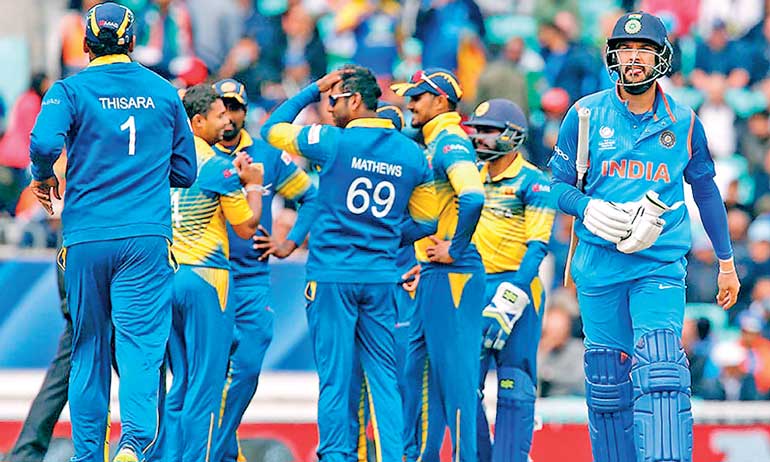Friday Feb 27, 2026
Friday Feb 27, 2026
Wednesday, 4 August 2021 00:00 - - {{hitsCtrl.values.hits}}

By Sa’adi Thawfeeq
It is high time that the administration of Sri Lanka Cricket (SLC) and the Cricket Technical Advisory Committee came down from their high horses and resolved the player contract issue which took a back seat during the recent white ball series against India.
What these so-called pundits do not seem to understand is that it is callous to refuse annual contracts to cricketers. What they seem not to foresee is that if the livelihoods of the present set of players are not secured and handed annual contracts, a mass exodus of players to other countries, and early retirements of several senior players to play in privately sponsored franchise leagues to earn their bread and butter, is inevitable. The elected administrators and the appointed Technical/Advisory Committee appear to be hell bent on punishing the cricketers for daring to challenge their obnoxious ill-thought policies with little regard for the welfare of the game of cricket in the country.
The signs emerging as a result of these ill-advised policies are ominous, with several experienced cricketers planning their retirement from international cricket in disgust. It started with top order batsman and former Sri Lanka captain Upul Tharanga announcing his retirement in February this year at the age of 36. He was followed by another white ball cricketer and a former captain Thisara Perera, who announced his retirement in May, aged 32. The recently concluded one-day series against India saw another white ball all-rounder, Isuru Udana, announcing his retirement from international cricket at the age of 33. All three players did so either as a result of the new selection panel’s policy to bring fresh legs into the team at the expense of experience or due to the contract dispute that had left them with no stable income to sustain their livelihoods.
Due to the cussedness of SLC and the Technical/Advisory Committee, senior players like Angelo Mathews, Dimuth Karunaratne, Dinesh Chandimal and Suranga Lakmal were overlooked for selection for the recent white ball series against Bangladesh, England and India – all of which Sri Lanka lost with the exception of one, the recently concluded T20I series against a depleted Indian side. The win was something that the national team badly needed following a string of defeats, but it is not going to end there. However, the silliness or lack of knowledge of the selection policies being adopted is quite stark when one takes the example of Lakmal being overlooked for the ODI series against Bangladesh, England and India. Especially given his track record and the maturity and performance he displayed in the Test series against the West Indies.
It is foolhardy to be celebrating winning the T20I series against a depleted Indian side. The Indians could have easily packed their bags and departed under the circumstances. However, they displayed exemplary sportsmanship and support towards the revival of cricket in Sri Lanka. We should be acknowledging their goodwill instead of trying to project the series win as a major achievement (‘road to recovery’) by doling out $ 100,000 to the team. What these gentlemen seem to forget is that there is widespread discontentment over the non-issuance of central contracts and the players need to be redressed as a matter of priority.
What is more damning is the stand taken by SLC and the Technical/Advisory Committee. They took an unfair decision not to present the national cricketers with annual contracts despite the fact that the majority of them had agreed to sign it after they had seen their individual performance-based points (which the SLC made available to them during the tour of England), which was the bone of contention for initially not signing the contracts. So why then this sudden change of heart and hard stance taken to deprive the players of their annual contracts by SLC and the Technical/Advisory Committee, just because they requested for transparency over a new performance-based contract? The players, for their part, only muddled the issue further by playing into the hands of SLC when vice-captain Kusal Mendis, Danushka Gunathilaka and Niroshan Dickwella went out on a stroll in the city of Durham during the tour of England and broke the bio-secure bubble.
Muttiah Muralitharan, a member of the Technical/Advisory Committee, went on national television to say that when the contract was offered to the players, they refused to sign it on the grounds of transparency, so they were not given it for this year and offered only tour contracts. It is most unfortunate that these players have chosen to insult and disparage their own former teammates, when not so long ago they themselves were fighting for every last penny when their contracts were being discussed. The only difference is that during these discussions there was total confidentiality, all the hard negotiations took place behind closed doors, and the public was not privy to every minute and sensitive detail unlike today. It is perhaps a reflection of the calibre and quality of the experienced and qualified administrators who occupied these seats at SLC during those times of yore.
The inquiry into the three cricketers breaking the bio-bubble, and the punishment meted out to them, clearly displays the reactionary style of administration in place today. Appointing an independent committee to inquire into this matter, ignoring the Disciplinary Committee already in place with eminent personalities, demonstrates the non-adherence to accepted protocol and the selective manner in which inquiries are carried out. A former engineer attached to SLC too has been victimised in this manner causing immense hardship.
What these ill-advised administrators do not seem to realise is that dishing out such a harsh punishment on arguably the three best batsmen in the country is akin to ‘cutting their nose to spite their face’. Eminent international cricketing personalities like Stuart Broad, Michael Vaughan and Harsha Bhogle have also expressed utter surprise to the severity of this punishment.